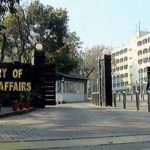
ISLAMABAD, Nov 10 (APP): The Acting Foreign Minister of Afghanistan, Amir Khan Muttaqi, arrived here Wednesday on his first visit to Pakistan to discuss ways to facilitate transit trade, cross-border movement and support for the people of Afghanistan who are urgently awaiting humanitarian assistance as the winter approaches.
Pakistan has extended humanitarian and economic assistance to the Afghan people and has also urged the international community to urgently extend support to alleviate the suffering of its people. After the fall of the Ashraf Ghani regime in Kabul, no country has so far extended recognition to the country. The United States of America has frozen the US 9.5 billion dollars of the Afghan Central Bank and it has become extremely hard for the new government to feed, provide shelter and healthcare for its people.
The Afghan acting Foreign Minister will be participating in a meeting of the Troika plus on Afghanistan, on Thursday.
The important meeting will be attended by Special Representatives and Envoys from Afghanistan from China, Russian Federation, United States and Pakistan, a statement from the Foreign Office said.
Foreign Minister Shah Mahmood Qureshi would inaugurate the meeting, which would discuss in detail the situation in Afghanistan and the way forward.
“Pakistan attaches high importance to the Troika Plus mechanism on the situation in Afghanistan. Pakistan hopes that deliberations of the Troika Plus meeting would contribute to the ongoing efforts for achieving lasting peace and stability in Afghanistan,” the Foreign Office said.
A senior diplomat privy to the details said Pakistan was holding a “structured dialogue” on Afghanistan and has taken all the key players on board. On the contrary, the NSAs meeting in New Delhi clearly lacked any clarity and direction.
“Even they did not share any agenda for the Nov 10 meeting and at the last moment tried to again raise the threat that Afghanistan might revert to being a hotbed of terrorism.”
India on Wednesday held a Regional Security Dialogue on Afghanistan that was attended by National Security Advisers and Secretaries of the National Security Councils of India, Iran, Kazakhstan, Kyrgyzstan, Russia, Tajikistan, Turkmenistan and Uzbekistan. It did not invite Afghanistan.
Making efforts to show its relevance, New Delhi highlighted the “threats arising from terrorism, radicalisation and drug trafficking” in Afghanistan. Of the 12 points discussed at the meeting, four were related to extremism, terrorism, radicalisation and drug trafficking.
“Humanitarian concerns” were the last in order of priority in a statement released at the end of the meeting by the Ministry of External Affairs.
Pointing to the timing by India in holding its dialogue, the diplomatic experts however believe that India tried to become relevant to the Afghan situation, but the fact of the matter was that Pakistan was the key player and was evident by the level of participants for the meeting.
National Security Adviser of Pakistan Moeed Yusuf declined to attend the meeting saying “peace spoiler cannot be a peacemaker”, in an oblique reference to what India has done in Afghanistan over the past two decades and how it used its soil to carry out subversive activities against Pakistan.
China, on the other hand, also declined participation citing “scheduling difficulties” issues.
For Pakistan, the looming humanitarian crisis seems to be the top priority and has also been pointed out by international aid agencies.
Nearly 23 million people, or 55 per cent of the Afghan population, are estimated to be in crisis or experiencing emergency levels of food insecurity between now and March of next year.
The latest Integrated Food Security Phase Classification (IPC) report co-led by the Food and Agriculture Organization (FAO) and World Food Programme (WFP), said that the lives, livelihoods and access to food for 22.8 million people will be severely impacted.
“It is urgent that we act efficiently and effectively to speed up and scale up our delivery in Afghanistan before winter cuts off a large part of the country, with millions of people – including farmers, women, young children and the elderly – going hungry in the freezing winter”, said FAO Director-General QU Dongyu. “It is a matter of life or death”.
The IPC report found that more than one-in-two Afghans will face Phase 3 crisis or Phase 4 emergency levels of acute food insecurity from November through the March lean season, requiring an urgent international response to prevent a humanitarian catastrophe.
“We cannot wait and see humanitarian disasters unfolding in front of us – it is unacceptable”, he said in a statement, made few days back.






